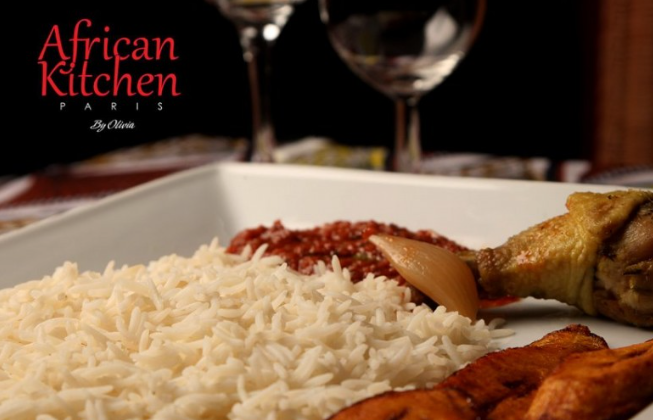African Kitchen: Nigeria in Paris

There is something warm about being around your people, as Nigerians say, especially in a foreign city, country, or even continent.
That's what I was thinking wheb I stepped into the African Kitchen, a Nigerian restaurant in Paris. I had found it online and once took my friends there in October to celebrate our independence day. Since then, I have become comfortable with the restaurant. It has become the answer to homesickness. Perhaps it's the familiarity of the Pidgin English the owners use to communicate amongst themselves and with the Nigerian customers who come in groups and use different Nigerian languages. Or perhaps it's the menu, the familiarity of traditional dishes – Okro, Banga, Egusi and Ogbono soups – that seem just too odd to be eaten in Paris. For one, the soups require starch (such as Eba, pounded Yam and/or Amala); and secondly, eating them with cutlery looks so strange and unfamiliar, yet the thought of eating with bare fingers in a city known for its elegance is equally strange.
“Are you Rachel’s friend?” said an Asian girl sitting alone at a table for six. I said yes, Rachel and I had attended the same school back in South Africa. I invited her to join me and some AUP friends of mine. Moments later, we went through the menu. I tried to explain each dish and, when unable to find the right descriptions, we turned to Google. “Pounded yam,” I learned, “is like marched potatoes. The yam is cut in relatively small pieces, cooked too softly, then pounded and usually put into modules. Like the name suggests.” We went through the soups and, for lack of better terms, I described Okro and Ogbono soups as “drawy”.
Bobo, another friend, was curious enough to try one of “drawy” soups. Not knowing what to expect, he was dazed when the soup dragged from his fork and I captured his reaction in a worthy Snapchat-length video. Rachel tutored him on how to eat it before settling for her own Eba and Egusi soup, explaining how she had missed home food.
African Kitchen
92 rue Saint-Maur, 75011
Open 12 pm till midnight
Tel: 09 50 41 22 17








